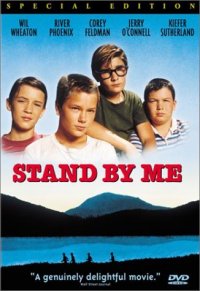|







|
|

 review by
review by  Jurassic
Mark Jurassic
Mark
Picture: Fine by me.
Sound: Fine by me.
The DVD for Stand by Me features a full length commentary by director Rob
Reiner. Normally, I would rather watch a movie than listen to the audio
track. There are several reasons why:
1) Often, key personnel are missing from the commentary. I don't want
supplementary material from assistant producers, key grips or supporting
actors. This usually happens because the crucial people are dead,
unavailable, abhor talking on audio tracks or want nothing to do with the
movie. If you don't have a (living) director or major actor lined up for
your DVD commentary, I say skip it.
2) Sometimes key personnel are involved with the audio track, but you
begin to suspect that they may not be the brilliant filmmakers you thought
they were.
3) Key personnel are involved, but would rather promote themselves rather
than talk about the techniques of filmmaking. These people usually take
credit for something they obviously had nothing to do with. A director
will talk about his story (when the movie was based on someone else's
novel). These people will have you disbelieve the axiom that movie making
is a collaborative effort.
In Stand by Me, Director Rob Reiner does a nice job of making himself seem
like a genius and everyone else as competent helpers. For example, Stand
by Me is based on the novella The Body by Stephen King; yet, King's tale
is slyly usurped by Reiner. When Reiner literally uses King (such as the
vomit story), Reiner says he didn't think it was very good, but "audiences
loved it." With one statement, the director criticizes King, and covers
his own ass.
Reiner otherwise takes credit for the story throughout the commentary. I
didn't have a problem with much of this. I believe Reiner and co-writers
Raynold Gideon and Bruce Evans did an admirable job expanding King's
original idea. They also wrote much of the dialogue Yet, Reiner goes out
of his way to applaud himself for improving King's novella. I find this
very strange because Reiner recorded the audio track long after filming
another Stephen King story called Misery. I've read The Body; and I've
read Misery. I think Misery is devoid of a commentary track because Reiner
changed very little of the source material..
Is Reiner a technically sound director? He mentions early in the
commentary that he doesn't like to talk about technical matters. I think
this is a copout. He actually does talk about camera work and
cinematography. Unfortunately, all he talks about is shooting scenes from
a long lens. I was left with the belief that in 1986 (Reiner's third film)
he learned how to effectively use a long lens. I cannot emphasize enough
Reiner's stylistic long lens (all kidding aside).
Reiner has only directed twelve films to date, but seven are quite good
(his first seven). All of these titles fit comfortably on my DVD shelf.
They are as follows: This is Spinal Tap, The Sure Thing, Stand By Me, The
Princess Bride, When Harry Met Sally, Misery, and A Few Good Men.
Reiner's last five films are: North (universally panned), The American
President (good if you ignore the liberal "brainwash"), Ghosts of
Mississippi, I Am Your Child (TV), and The Story of Us (regarded slightly
better than North).
If I were a movie fan contemplating listening to the audio track for Stand
by me, I would consider Reiner's recent examples as an inadequate director
and skip his self-indulgent DVD commentary.
 Jurassic
Mark Jurassic
Mark
SCORE: 3½
 Stars Stars

Separate, apart, entirely different from my DVD review,
I have nothing but good things to say about Rob Reiner's Stand by Me.
The premise is sound. Four children embark on a curious adventure to see
a dead body. The time and place for our tale is important. The kids live
in a small town in the late Fifties (perhaps early Sixties) where they
enjoy an independence which does not exist today.
The juxtaposition of loss of innocence and witnessing death is an
important theme in Stand by Me. It's not a new theme. Immediately I
think of Stephen Crane's The Red Badge of Courage. There is also a
contemporary film comparison. Stand by Me came out in 1986. The Oscar
winning film for that year was Oliver Stone's Platoon. In a key scene
early in the movie, Chris (Charlie Sheen) sees his first dead body. He
gets the dry heaves, and, graphically his innocence begins to dissolve.
Stone's dialogue brilliantly underscores the moment. Platoon Sergeant
Barnes (Tom Berenger) sums Chris up as "...one simple son of a bitch."
I can't talk about Stand by Me without using tired phrases like "coming
of age." Nevertheless, I'm not prepared to call it a "formula picture."
I commend those who can tell stories about their teenage years. Many
people look back on their early teens as the best times in their lives.
I'm one of those people. Stand by Me is a great film because it sets the
perfect tone. The movie is sentimental, but never maudlin. Lesser films
cross the line and become sappy. Stand by Me is more concerned with
telling a complete story than trying to manipulate you into numb,
nostalgic mood. |
